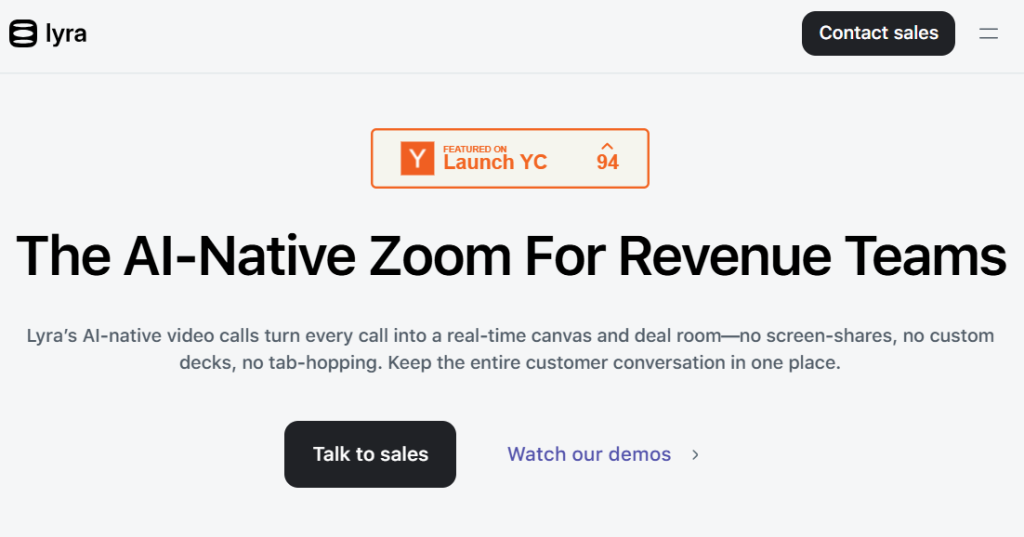Lyra Raises $6M to Redefine Workflow Automation with AI for Modern Teams
August 12, 2025
byFenoms Start-Ups

Lyra, a Y Combinator (YC X25) startup founded by Courtne M., has successfully closed a $6 million seed funding round. Backed by investors including 468 Capital, Rebel Fund, Y Combinator, Transpose Ventures, and operators from Ramp, Gusto, and Zapier, Lyra is set to build the AI infrastructure powering the next generation of team collaboration and workflow automation.
In a market flooded with task managers and team dashboards, Lyra is taking a bolder approach: building an intelligent platform that deeply understands workflows, adapts to real-time organizational needs, and proactively eliminates friction between tools and team members.
A Smarter, Adaptive Layer for Work
At the core of Lyra’s product vision is a shift away from rigid templates and siloed SaaS tools. The platform allows users to create and evolve workflows dynamically using AI agents trained to support decision-making, process flow, and real-time collaboration.
While others are simply layering generative AI into static tools, Lyra is building around the concept of workflow intelligence from day one. Their model not only helps users execute tasks faster, but also recommends ways to improve the flow based on actual usage data and outcomes. Think: Notion meets AI project manager meets Zapier, but contextual, conversational, and scalable.
As the demand for knowledge work productivity climbs, legacy tools are showing their age. Lyra’s agents can analyze communication patterns, execution bottlenecks, and repetitive operations - and then deploy smart interventions.
Courtne shared that Lyra is already piloting integrations with early-stage startups and mid-market companies to streamline onboarding, customer support, and product management workflows.
It’s Not About “Replacing Jobs” - It’s About Orchestrating Value
Here’s a game-changing truth founders should internalize: the real power of AI in productivity isn’t automation for the sake of fewer hands. It’s orchestration that frees up human attention for higher-leverage work.
Lyra is a case study in this philosophy. Rather than simply “auto-completing” repetitive tasks, the platform analyzes what contributes to momentum - and what consistently stalls it. This allows teams to focus on momentum-driving work, whether it’s engineering velocity, user onboarding, or retention loops.
By blending LLMs with data-driven feedback loops, Lyra’s tools adapt to how each team works - not the other way around. This reduces the adoption tax, increases time-to-value, and builds trust between AI and operators. The platform doesn't just do work - it collaborates with intention.
This ethos is why angel investors from Zapier, Ramp, and Gusto leaned in. These operators recognize how critical it is for modern teams to move fast without drowning in context-switching or duplicated effort.
The Rise of AI-Powered Collaborative Infrastructure
The trend toward AI-native infrastructure is accelerating, with workplace SaaS evolving from simple toolkits to full-stack orchestration layers. Lyra sits squarely at this inflection point. Its goal: become the connective tissue between apps, people, and organizational goals.
Over the past year, early users have reported:
- 28% reduction in meeting hours by automating status updates
- 40% faster onboarding for new hires with guided workflows
- 2x increase in goal alignment accuracy via integrated KPIs and nudges
The UI/UX borrows lessons from consumer apps, making Lyra accessible without needing a systems integrator. Meanwhile, its backend logic offers serious depth: multi-agent systems that self-improve based on feedback and execution outcomes.
Why This Round Matters
The $6M seed round gives Lyra the runway to:
- Expand engineering and AI research teams
- Launch beta partnerships with Series A-B startups
- Deepen integrations across tools like Slack, Jira, Notion, and Salesforce
- Iterate on no-code custom workflow builders
- Scale go-to-market and support orgs
468 Capital’s backing signals a strong belief in Lyra’s ability to play at the infrastructure level. Rebel Fund and Transpose Ventures add YC operator firepower, while support from product veterans at Ramp, Gusto, and Zapier gives Lyra strong early distribution and feedback networks.
The funding will also accelerate the company’s mission to bring AI-powered clarity to overloaded workflows in hybrid and remote teams - a pain point that continues to grow as knowledge workers juggle increasing digital complexity.
The Future of Intelligent Work Orchestration
The market for workflow automation and productivity tooling is experiencing a boom. According to Grand View Research, the global business process automation (BPA) market was valued at $12.7 billion in 2022 and is expected to reach $31.4 billion by 2030, growing at a CAGR of 12.2%.
In parallel, the generative AI software market is expected to exceed $52 billion by 2028, as companies adopt LLM-powered assistants to streamline internal operations. However, the biggest winners won’t be general-purpose AI tools - they’ll be verticalized platforms like Lyra that combine AI, context, and workflow depth.
What makes Lyra especially timely is its ability to sit across verticals - from marketing teams and customer support to engineering and product ops - without being prescriptive. The platform doesn’t assume how work should get done; it learns and adapts to each team’s language, cadence, and KPIs.
If the first generation of AI productivity tools was about augmentation, the next is about orchestration. Lyra isn’t building yet another app - it’s building an adaptive operating system for how modern teams move.









